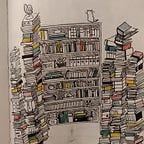Wuhan Diary is a collection of blog posts written by Chinese author Fang Fang, over the course of 60 days of Wuhan’s citywide quarantine starting January 25, 2020 during the early days of the COVID-19 pandemic. The blog posts were originally written in Chinese and shared on social media platforms like WeChat and Weibo as an account of Fang Fang’s daily life under quarantine. I read the book in June 2020, as cases in Delhi continued to rise, and the emotional states and thought processes Fang Fang describes felt eerily similar to what I had experienced during various points of my own quarantine.
In the prologue (or it might have been the epilogue) Fang Fang notes that she did not edit the blog posts when they were compiled into the book. The collection is particularly unique because of its rawness — it offers insights into her thinking in the moment, untainted by any retrospective reevaluations. Wuhan Diary is a fantastic account of the early days of the pandemic precisely because it does not give us the luxury of 20/20 hindsight. Fang Fang powerfully documents the paranoia, fear, sadness, and anxieties the people of Wuhan experienced. Many entries are a pastiche of social media posts and WeChat forwards. Unlike mainstream media coverage, she rarely looks to studies or authorities for information, instead relying on messages from friends and forwards in group chats — perhaps a more accurate representation of many people’s experiences of the pandemic. She is aware of this, writing, “As an independent writer, [I] only have my own tiny perspective on things. The only things I can pay attention to and experience are those little details that are happening around me and those real people I encounter in my life. And so that’s all I can write.”
In consuming Chinese language social media posts in the form of an English language book, we irreversibly change some aspects of the experience that real-time readers in China would’ve had.
The translation from Chinese was ably executed in record time by Michael Berry. As a consequence of being a translation of real-time Chinese blog posts, the writing feels simplistic at times and there were some entries that I skimmed through. However, the book still has some exquisite turns of phrase and metaphors, such as, “The powerful people of this world, the so-called victors, often don’t really care about literature; for them, literature is just a flowery adornment. But for the weak and dispossessed, literature is often a bright light that shines through one’s life, it is a wreath of straw you can cling to for support while floating down the river, it is the savior you can turn to when you are reaching the end.”
Fang Fang was targeted with a lot of vitriol from some sections of Chinese society due to her critiques of the government response (critiques which are mild by many international standards). She touches upon some of these trolls and criticisms in her later entries, though by rendering dynamic social media posts into static pages, we lose the ability to see the comments that she didn’t choose to explicitly reflect in her writing. By being unable to scroll through comment sections and having no access to the universe of Chinese social media, I only know of those aspects of the trolling (as well as support) that Fang Fang talks about (though internet searches for news articles fill this gap somewhat).
Initially, I was also annoyed by the seeming changing tone of the entries. At many points Fang Fang questions government authorities and calls out their missteps, at some others she urges readers to “put our faith in our leaders; we need to believe in them.” Upon more thought however, I realised that this sort of vacillation does not point to inconsistencies or incoherence, but rather is a truer depiction of our changing daily mental states. I, too, am not beyond being satisfied by responses of the Delhi government on one day and frustrated the next. The critiques offered by Fang Fang may seem mild to foreigners but the severe backlash it attracted is a testament to how bold her writing was.
